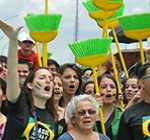The Aam Admi Party (AAP) swept to power in this week’s state election in Delhi, with the broom as its symbol, capturing global attention as it comprehensively defeated the BJP.
But Latin America has an interesting history of David-Goliath election battles, and some interesting comparisons are listed below.
Brazil
Long before AAP it was a Brazilian political party, the National Democratic Union (UDN), which used the ‘broom’ as a campaign symbol in 1960, promising to sweep away corruption and immorality.
The centre-right UDN party’s presidential candidate, Janio Quadros, won the 1960 presidential elections with a big margin. One of his unforgettable, and rather unBrazilian, moral cleaning acts, was to prohibit the wear of bikinis on the beach. With no previous national political experience, and without a Congressional majority, he was frustrated by the obstructionism of the Congress and dissident voices from his own party.
Quadros was high-handed and inflexible in negotiations with other political leaders and parties. In August 1961, after just seven months in office, he resigned suddenly, expecting that his histrionic gesture would prompt a wave of popular demand to withdraw his resignation. There was no such public wave. The Brazilian Congress quickly accepted his resignation and elevated the vice president in his place. Quadros went into political wilderness, and it was only after many years that he re-emerged, elected as Mayor of Sao Paulo in 1985.
Mexico
In the 2000 elections, Mexicans voted out Institutional Revolutionary Party (PRI), ending its 70-year, one-party regime as the longest ruling party in the world. The Mexicans instead elected Vicente Fox from the centre–right National Action Party (PAN) as president. This was a historic change. But in the same year, the voters of Mexico City elected Lopez Obrador, a fire-brand of the extreme-left Revolutionary Democratic Party (PRD) as the head of the government of the Federal District of Mexico—a city with a population even larger than Delhi’s.
The Fox-Obrador contrast is similar to the Modi-Kejriwal combination in New Delhi.
Obrador was considered a rebellious and unconventional but charismatic politician with radical views. He was eccentric and an anarchist, the underdog in the big business-supported PAN and PRI party fight. Obrador portrayed himself as a crusader against corruption and the collusion between corporates, media barons and political parties. He was personally honest, uncorrupt, a self described leader of the social movements who lead a simple, unostentatious life. He connected with the masses using social media.
As head of the government of Mexico City during 2000-2005, Obrador reduced corruption and implemented a number of pro-poor policies as well as improved the transportation and infrastructure in the city. Despite his anti-big business rhetoric, he collaborated with corporate houses on a project to restore and modernize the historic downtown area and actively encouraged private sector investment in housing sector.
His success as chief of the government of Mexico City did not however help him in his attempts to win the national Presidential elections, losing narrowly in 2006 and then in 2012 by a bigger margin. After losing the Presidential elections in 2006, he paralysed Mexico City for three months with demonstrations against the election results, arguing that they were fraudulent and proclaiming himself the winner. It didn’t work. Obrador left the PRD and formed his own outfit. Alas, his chances of becoming a future president of Mexico have been eroded by his egocentric ways.
Colombia
In the last four national elections, the Colombians elected Alvaro Uribe (for two terms from 2002-10) and Manuel Santos (also twice in 2010 and 2014) from the centre-right parties because of their important national agenda to end guerrilla war and bring peace to the country. However, in 2011 the residents of the capital city Bogota voted for a radical leftist and former member of the M-19 guerrilla group Petro as Mayor. But when Petra contested in the Presidential elections in 2010 the Colombians preferred the experienced centre-right candidate Manuel Santos.
Lessons for AAP, Congress and BJP
The broom politics of Brazil and the experience of the chiefs of the city governments of Mexico City and Bogota, particularly in their failed presidential elections, might have some useful lessons for Kejriwal as the Aam Aadmi Party prepares to go national.
Mexico’s PRI learnt its lesson after being out of power at the national level for twelve years. It reinvented itself and came back to power under the dynamic leadership of Enrique Pena Nieto who won the Presidential elections in 2012 beating the candidates of leftist PRD and conservative PAN parties. The Congress Party may find it useful to study and learn from the resurrection model of PRI.
Nieto worked with the opposition parties and signed the ‘Mexico Pact’ in which four major national-level parties agreed to a consensus for major urgent reforms. Through the pact, the Nieto administration delivered a dozen important reforms in sectors such as energy, education and taxation in the last two years. Mexico has achieved more reforms than any other large democracies in the world in the last two years. BJP could work with the opposition parties for a similar ‘Delhi Pact’ based on the successful model of Mexico Pact.
Ambassador Viswanathan is Distinguished Fellow, Latin America Studies, Gateway House. He is the former Indian Ambassador to Argentina, Uruguay, Paraguay and Venezuela, and Consul General in Sao Paulo.
This blog was exclusively written for Gateway House: Indian Council on Global Relations. You can read more exclusive content here.
For interview requests with the author, or for permission to republish, please contact outreach@gatewayhouse.in.
© Copyright 2015 Gateway House: Indian Council on Global Relations. All rights reserved. Any unauthorized copying or reproduction is strictly prohibited


